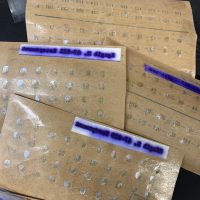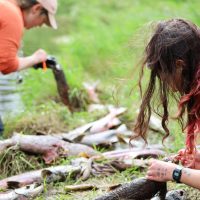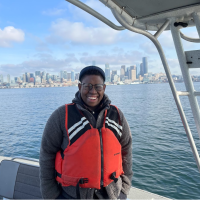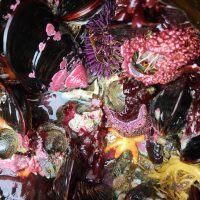Filter Results
Vital communications among the critically endangered Cook Inlet belugas may be masked by ship noise
New research led by SAFS doctoral student, Arial Brewer, documents the vocal repertoire of Cook Inlet beluga whales for the first time.
Read moreSalmon, scales, and spectrometry: analyzing historical fish scales to explore food web changes over time
For over 60 years, the Alaska Department of Fish and Game have collected scales from sockeye salmon in Bristol Bay. Now, these scales are receiving special treatment in a new project led by SAFS graduate student Grace Henry, who is conducting stable isotope analysis to examine how food webs in the North Pacific Ocean have changed since the 1960s.
Chemistry has always been Grace’s biggest interest: “I love chemistry, and for me, it’s the cornerstone of ecological science.” Working with stable isotopes in her pre-graduate studies, Grace wanted to use this method during her thesis work on food webs using historical archived samples.
Part 2 of our video series featuring the Alaska Salmon Program now live
Watch Part 2 of a summer with the Alaska Salmon Program, now live, featuring the students who are essential to the program.
Read moreStudying toxic metals in fish in southeast Asia’s largest freshwater lake
In the largest freshwater lake in southeast Asia, Shorna Sabikunnahar is looking into the ecological and environmental drivers of toxic metals in resident fish.
Conducting her research on Tonle Sap Lake in Cambodia, which is part of the Mekong River system, Shorna is a SAFS PhD student in the Holtgrieve Ecosystem Ecology Lab (HEEL). Designated as a Biosphere Reserve by UNESCO, Tonle Sap Lake is one of the most diverse and productive ecosystems on the globe.
Multiple lines and levels of evidence for avian zoochory promoting fish colonization of artificial lakes
Understanding how obligate freshwater organisms colonize seemingly isolated ecosystems has long fascinated ecologists, with new research co-authored by Flavien Garcia and Julian Olden demonstrating possible bird-mediated colonization of lakes by European perch.
Read moreDiving deep into how fish impact carbon cycling in the ocean
Recently featured in Hakai Magazine’s article “All The Fish We Cannot See”, SAFS PhD student Helena McMonagle is conducting a deep dive into a hidden cache of fish that might play an unexpected role in how the ocean sequesters carbon. We caught up with Helena to find out more about it.
Since starting this research in 2019, I’ve been using data collected at sea and in the lab, along with bioenergetic models, to estimate how much carbon these mesopelagic fish, such as lanternfish, transport from surface waters into the twilight zone.
Working with the Port of Seattle during a Washington Sea Grant Fellowship
Selected as the 2022–2023 Washington Sea Grant Keystone Fellow, Ashley Townes spent a year working with the Port of Seattle’s maritime habitat team on advancing the development and implementation of innovative habitat restoration projects including kelp research, fish sampling with underwater remote operated vehicles (ROVs) and 360-degree cameras, and bankline monitoring to survey the condition and character of shorelines at port facilities in the Lake Washington Ship Canal, Shilshole Bay, Elliott Bay, the East and West waterways and the Duwamish Waterway.
Read moreSupporting Tribal-led salmon monitoring using computer vision
UW researchers are developing a drone-based salmon survey method that the Sauk-Suiattle can use to manage resources.
Read moreCelebrating LGBTQ+ in STEM
Celebrating and highlighting the work of LGBTQ+ people in science, technology, engineering, and math (STEM) has a special day on the calendar: November 18. Why this date? It is based on the 60th anniversary of American Astronomer and gay activist Frank Kameny’s fight against workplace discrimination, which he took to the U.S. Supreme Court.
Science is a place of innovation, research, and progress, but many communities are still marginalized in these spaces.
Read moreSAFS Graduate Student Symposium Program now live!
From corals, birds and salmon to microplastics, otolith microchemistry and fisheries management, join us for a day full of grad research from around the world.
Read more








